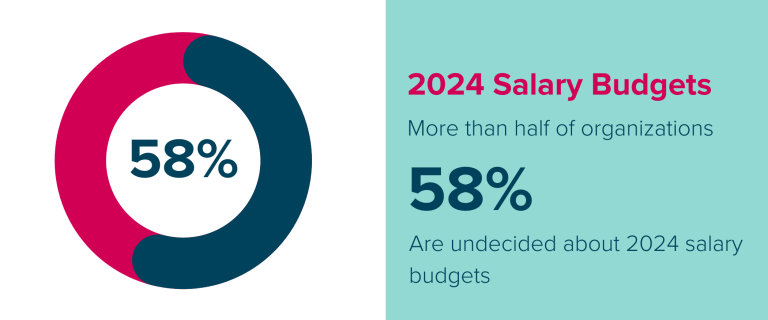

Features
Compensation
Base salary increases in Canada expected to decline in 2024, new data shows
September 27, 2023
By
Talent Canada
 Photo: Adobe Stock
Photo: Adobe Stock Base salary increases in Canada for 2024 are expected to be lower than what workers saw this year, according to new data from Eckler.
The national average increase next year is projected to be 3.9%, excluding planned salary freezes. That’s less than 2023 projected increase of 4.2% and below the 2023 actual increase of 4.4%, it said.
“As organizations continue to grapple with ongoing economic uncertainty and a tight labour market, our survey shows that many are projecting salary increases close to recent highs,” said Anand Parsan, national compensation practice leader at Eckler.
But there is still some crystal ball gazing going on, as the majority of organizations (58%) are undecided at this point about their 2024 compensation budgets — but they’re not overlooking the impact of money on their talent management strategies, it said.
Majority of organizations undecided about 2024 salary planning budgets but not overlooking impact of compensation on talent management strategy.
The survey revealed that more than half (58%) of organizations remain undecided about 2024 salary budgets.
“As we head into next year, employers and employees alike have had to navigate increasing interest rates by the Bank of Canada and talks of a looming recession – it’s not surprising that nearly half of the organizations surveyed are still undecided regarding their 2024 salary planning budget,” said Parsan.
The results also indicate that compensation remains a vital component in attracting and retaining talent with nearly one in five respondents reporting that they have a separate promotional budget for internal recognition and fewer than 1% reported a planned salary freeze.
Regional, industry breakdowns
- Alberta, British Columbia, and Prince Edward Island projecting the highest average salary increases with a range of 3.9% to 4.0%.
- The lowest anticipated salary increases range from 3.3% to 3.6% for the Northwest Territories and Newfoundland and Labrador respectively, with all other provinces forecasting 3.7%.
- The highest projected average salary increases by industry are expected to be in mining (7.3%), information technology / high technology (4.7%) and professional, scientific and technical services (4.4%).
- Healthcare (2.9%), education (3.3%) and collectively charities, foundations, member organizations and professional associations (3.4%) reported the lowest projected salary increases.
Broad HR initiatives remain a priority
Chris Brisebois, leader of Eckler’s largest Pension and Benefits consulting practice, said, “Compensation remains a significant component in an organization’s rewards strategy. However, our survey shows that organizations are also focused on a more holistic talent management strategy.”
Top HR initiatives reported include:
- Participating in salary benchmark surveys (53.0%)
- Enhancing total rewards strategies to be more well-rounded, flexible and employee centric (47.6%)
- Conducting and/or producing more resources and education training on compensation for people leaders (46.3%)
- Having up-to-date job descriptions (42.2%)
Adopting measures to collect and analyze workforce demographic data to support diversity, equity, and inclusion initiatives (34.8%)
Brisebois concluded, “Your people are your most important asset. How you reward and support them should reflect that. As organizations continue to solidify their talent management strategies, total rewards programs that engage and enable your people while remaining sustainable for the organization, is critical – and never more so than during difficult economic environments.”
Eckler’s Compensation Planning Survey, was conducted from June to August 2023 and collected responses from over 300 Canadian organizations across diverse sectors and industries. Survey results provide critical data on salary, pay administration practices, market trends and human resource priorities.
Print this page
